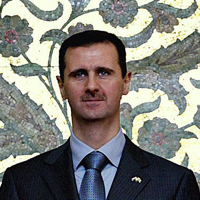Recent polls indicate that a majority of Americans and Europeans don't want NATO to widen its war against embattled Libyan leader Moammar Gadhafi. So long as the West's low-and-slow approach to regime change continues to weaken the dictator, there is good reason to stick with President Barack Obama's strategy of limited intervention. Yet as international cameras focus in on Libya, a prospective tipping point for the future of the Middle East becomes all the more visible in Syria, despite that country's ban on international journalists. And although Secretary of State Hillary Clinton has taken an admirably tough line regarding the Baath regime's "continued brutality," the White House still expresses more concern over Israel's policies in the West Bank and Gaza than over Syrian President Bashar al-Assad's increasingly bloody crackdown against protesters there.
Regrettably, it appears that the Obama administration's judgment has become mired in a fog of misconceptions about what regime change in Syria would really mean for the region and larger world. As a result, Washington may squander the biggest opportunity to date amid the Arab Spring to rehabilitate our image there as a force for positive change.
Held hostage by the Alawite Shiite, Iran-allied Assad ruling mafia, Syria is nonetheless a predominantly Sunni nation. Its citizens have long been captives of the father-and-son Assad dictatorship, which, aside from committing all manner of human rights violations at home, has become a crucial cog in Tehran's sponsorship of Hezbollah, the Lebanese paramilitary and political party recognized as a terrorist group by the U.S. and the U.K., among others.

